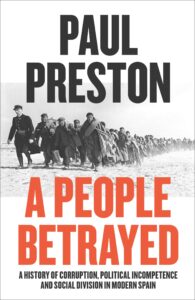Book Review: Paul Preston on Spanish Political Corruption
 A People Betrayed: A History of Corruption, Political Incompetence, and Social Division in Modern Spain, by Paul Preston. London: Liveright Press, 2020. 768 pp.
A People Betrayed: A History of Corruption, Political Incompetence, and Social Division in Modern Spain, by Paul Preston. London: Liveright Press, 2020. 768 pp.
In this wide-ranging book, Spain’s foremost scholar of the modern period surveys in detail the long history of corruption among the country’s political class. While corruption benefited from a deep public apathy, Preston’s account is also rife with the people betrayed rising in revolt and political elites sending in the troops to put them down. Tellingly, the 1931 Second Republic only arrives 227 pages in.
Preston starts in the mid-nineteenth century. He spends considerable time unpacking the turno pacífico, the nineteenth century political deal that alternated governmental power between the liberal and conservative parties. This leads into an exploration of the origins of the Catalan crisis and the Catalan contribution to republicanism, one of several reform movements that saw the monarchy as a source of corrupt governance.
The Spanish-American War of 1898 underscored the fact that the Spanish military’s only successes over the course of the nineteenth century had been at home. Less than two decades later, World War I—in which Spain remained neutral—brought an economic growth that was squandered by the country’s elites, while wartime profits were used for conspicuous consumption rather than investing in efficiency of operations or the labor force. Meanwhile, rampant corruption roused the ever more radical masses. Anti-corruption reform efforts that followed were repressed as Catalanist initiatives (even when they weren’t). Thirty-five percent of the 1921 budget was allocated to military expenses, with almost three quarters paying the salaries of a ballooning officer class (there was one for every four soldiers). The enlistees, meanwhile, remained as poorly trained as ever. The peace was kept largely through bribes. Only after Spain joined NATO, in 1982, did the army manage to crack down on its deeply embedded culture of corruption.
Preston corrects Raymond Carr’s claim that the 1923 coup that installed Miguel Primo de Rivera as dictator undermined democracy: there simply wasn’t enough democracy to undo. While it claimed to end corruption, the seven-year Primo regime was as corrupt as any government Spain had in the past century. Its ruthless repression of the opposition saw the CNT, the anarchist union, grow ever more militant and more effective, to which the government responded with more repression. Preston also lays considerable blame at the feet of King Alfonso XIII, who has generally escaped culpability.
Two of the faces of venality and graft of whom Preston makes frequent mention, in addition to King Alfonso, are Juan March and Alejandro Lerroux. The latter, who never saw a political office that he couldn’t benefit from financially, eventually got his due when the Republic confiscated his property at the onset of the civil war. The Majorcan banker March is another matter. If any single private individual held the keys to the onset of the civil war, Preston’s evidence suggests, it was March, whose personal fortune financed the procurement of necessary materials for the rebels. March’s corruption continued unabated under Franco—whose own kleptocracy doesn’t escape Preston’s watchful eye, either.
Preston’s focus on corruption allows him to shed a new light on Spain’s history of political tensions and problems of underdevelopment. He pulls no punches, offering judgment of incompetence on both the left and the right. Some readers might be surprised, for instance, when Preston writes that the anarchist educator Francisco Ferrer was financing terrorism or that the Socialist union leader Francisco Largo Caballero deserves no small amount of blame for the Republic’s woes.
Preston’s writing is as lucid as ever, although perhaps the period of the Transition receives a more truncated treatment than it deserves. On the other hand, Preston could easily have written an even bigger book. Rather than starting in the nineteenth century, he very well could have opened half a millennium earlier, with Pope Alexander VI, Valencian by birth. Indeed, reading Preston it’s difficult to avoid the impression that political corruption is a never-ending problem. Anyone paying attention to Spanish current events will find echoes of Alfonso XIII’s corruption in the King Juan Carlos I, while the re-emergence of Catalan republicanism reenacts, to some extent, the nineteenth-century response to the monarchy’s indiscretions.
Eric R. Smith, author of American Relief Aid and the Spanish Civil War (2013), holds a Ph.D. from the University of Illinois at Chicago and is an instructor of history at the Illinois Mathematics and Science Academy.












